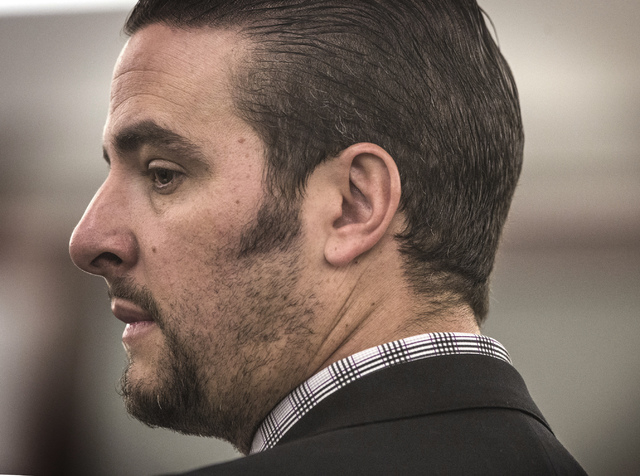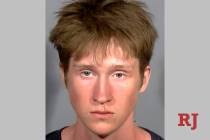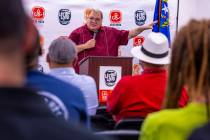Long sentencing wait has Nevada Bar seeking clarity suspending convicted lawyers

More than six months ago, Las Vegas defense lawyer Brian Bloomfield pleaded guilty in District Court to felony and gross misdemeanor charges in a sweeping courthouse counseling scheme.
Yet Bloomfield, 38, still hasn’t been sentenced because he is cooperating with prosecutors against other defendants in the scheme, which occurred between February 2008 and May 2010.
While free on bail, Bloomfield regularly has been defending clients in criminal cases at the Regional Justice Center as if his guilty plea never took place.
He even recently won permission from the district judge presiding over his case, Jessie Walsh, to get back his passport so he can travel to the “Mexican Riviera” for a vacation with his family in late August.
It all has created a dilemma for Nevada State Bar Counsel David Clark, tasked with protecting the public from lawyers who run afoul of the law.
A Nevada Supreme Court rule says the Bar can move to temporarily suspend a lawyer upon a “final judgment of conviction,” and the State Bar over the years has waited until a lawyer is sentenced. That’s when the federal courts, which see a lot of criminal cases against lawyers, recognize a final judgment of conviction.
But the Bloomfield case in District Court and a growing number of federal court cases involving lawyers have caused Clark to rethink his approach in moving against lawyers convicted of serious crimes.
Clark is hoping the Supreme Court will more clearly define the broad rule, which also allows the State Bar to seek a suspension after a guilty plea or jury conviction.
Earlier this past month, Clark made it clear he wants guidance from the Supreme Court when he filed a petition asking it to temporarily suspend Bloomfield before he is sentenced.
“Aside from being felony convictions, respondent’s crimes constitute direct fraud upon the court and the complete betrayal of his duties as a sworn officer of the court,” Clark wrote in the petition. “Respondent’s continued practice before the courts in Nevada is an affront to the public integrity of the legal system and the administration of justice.”
Clark wants the high court to prohibit Bloomfield, a member of the State Bar since 2003, from practicing law while the Bar considers disciplinary action against him stemming from his guilty plea.
“In the past this hasn’t been so much of a problem because there hasn’t been a long disconnect between a guilty plea and a sentencing,” Clark said. “But lately, we’ve been seeing a greater delay.”
In the federal investigation into fraud at Las Vegas-area homeowners associations, one lawyer who pleaded guilty and agreed to cooperate with federal prosecutors more than two years ago is still waiting to be sentenced, Clark said.
But Clark doesn’t have a free path to the Supreme Court in Bloomfield’s case. His lawyer William Terry is fighting the push to suspend Bloomfield.
Last week, Terry asked the Supreme Court to simply refer the matter to a State Bar disciplinary panel and allow Bloomfield to continue practicing law in the meantime.
Terry, who pointed out that Bloomfield self-reported his guilty plea to the Bar, submitted dozens of character letters in a bid to show that Bloomfield is still “held in high esteem by both other lawyers and his clients.”
The criminal case against Bloomfield dates to December 2011, when he, former counseling service owner Steven Brox and juvenile probation officer Robert Chiodini were charged in a 52-count indictment.
They were accused of providing prostitutes and other defendants with phony certificates of completion for court-ordered counseling and community service to resolve misdemeanor cases in Las Vegas Justice Court.
Weeks later, Bloomfield’s wife Amber McDearmon and former bail bondsman Thomas Jaskol were charged in a superseding indictment that included new allegations they conspired with Bloomfield to destroy evidence.
The case has dragged through the court system the past 2 ½ years.
Bloomfield pleaded guilty in December to two felony charges of forgery and offering a false instrument for filing or record, and two gross misdemeanors, conspiring to commit a crime and destruction of evidence.
He faces a maximum of 11 years behind bars, but also is eligible for probation.
McDearmon has a gross misdemeanor conviction for conspiracy to commit burglary, and her case is one of those identified in the superseding indictment as including phony certificates of completion.
She was living with Bloomfield during the scheme in 2010 and later married him in January 2012.
Bloomfield represented McDearmon, who never showed up for dozens of hours of court-ordered community service, but ended up getting certificates of completion for the hours, according to court documents.
One of Bloomfield’s former employees gave Las Vegas police bags of shredded documents from the lawyer’s downtown office at the time.
A police forensic scientist spent 2½ months assembling the documents piece by shredded piece to help prosecutors obtain Bloomfield’s indictment.
Brox’s former company, United States Justice Associates, was well-known at the Regional Justice Center, especially at Las Vegas Justice Court. That is where its counseling services were offered at the time of sentencing in mainly misdemeanor cases.
Some of Bloomfield’s co-defendants, including McDearmon, have been negotiating plea deals with prosecutors. Any remaining defendants are set to go to trial before Walsh on June 30.
Contact reporter Jeff German at jgerman@reviewjournal.com or 702-380-8135. Find him on Twitter: @JGermanRJ.


















